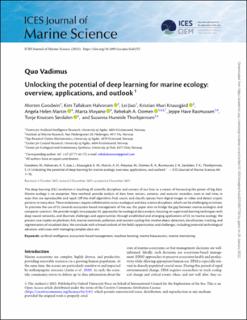Unlocking the potential of deep learning for marine ecology: overview, applications, and outlook
Goodwin, Morten; Halvorsen, Kim Aleksander Tallaksen; Jiao, Lei; Knausgård, Kristian Muri; Martin, Angela Helen; Moyano, Marta; Oomen, Rebekah Alice; Rasmussen, Jeppe Have; Sørdalen, Tonje Knutsen; Thorbjørnsen, Susanna Huneide
Peer reviewed, Journal article
Published version
Permanent lenke
https://hdl.handle.net/11250/2938707Utgivelsesdato
2022Metadata
Vis full innførselSamlinger
- Articles [3016]
- Publikasjoner fra CRIStin [3074]
Originalversjon
10.1093/icesjms/fsab255Sammendrag
The deep learning (DL) revolution is touching all scientific disciplines and corners of our lives as a means of harnessing the power of big data. Marine ecology is no exception. New methods provide analysis of data from sensors, cameras, and acoustic recorders, even in real time, in ways that are reproducible and rapid. Off-the-shelf algorithms find, count, and classify species from digital images or video and detect cryptic patterns in noisy data. These endeavours require collaboration across ecological and data science disciplines, which can be challenging to initiate. To promote the use of DL towards ecosystem-based management of the sea, this paper aims to bridge the gap between marine ecologists and computer scientists. We provide insight into popular DL approaches for ecological data analysis, focusing on supervised learning techniques with deep neural networks, and illustrate challenges and opportunities through established and emerging applications of DL to marine ecology. We present case studies on plankton, fish, marine mammals, pollution, and nutrient cycling that involve object detection, classification, tracking, and segmentation of visualized data. We conclude with a broad outlook of the field’s opportunities and challenges, including potential technological advances and issues with managing complex data sets.
